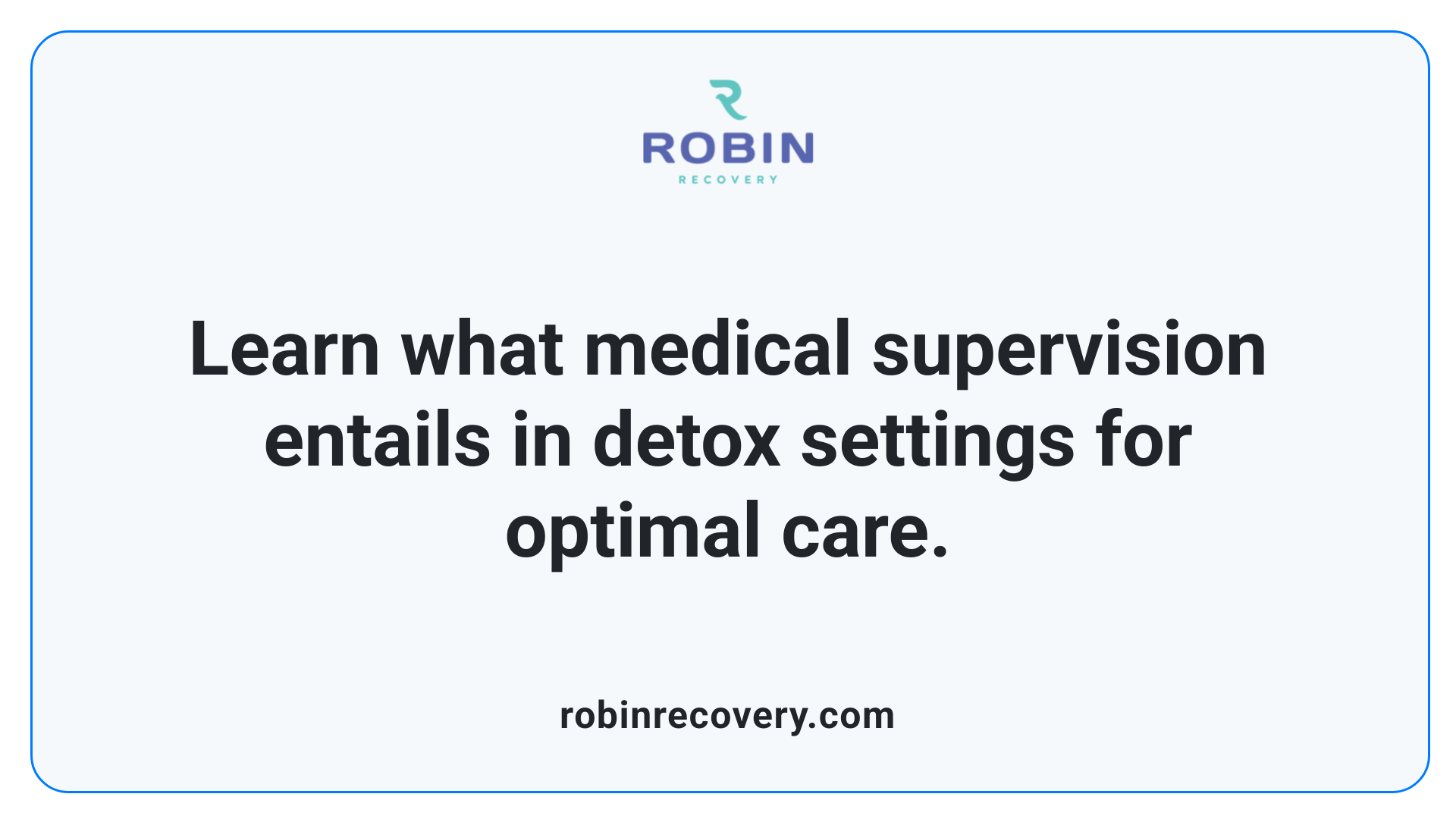The Role of Medical Supervision in Ambulatory Detox Programs

Understanding the Significance of Medical Supervision in Outpatient Detox Programs
Outpatient detox programs have gained prominence as a flexible, accessible alternative to inpatient treatment, allowing individuals to manage withdrawal in a supported environment while maintaining daily responsibilities. Central to the success and safety of these programs is the role of medical supervision, which provides continuous oversight, tailored medication management, and psychological support. This article explores the multifaceted importance of medical supervision in ambulatory detox, highlighting how professional oversight enhances safety, improves outcomes, and fosters sustained recovery.
Defining Medical Supervision in Detox Contexts

What does medically supervised mean?
Medically supervised refers to a process where a healthcare professional, typically a physician, regularly monitors, directs, and inspects a patient's or practitioner’s medical services, especially during restricted practice conditions. In the context of detoxification, it means that trained medical staff oversee the entire process, ensuring safety and responsiveness to any health issues that arise.
During detox, this supervision involves continuous monitoring of vital signs, managing withdrawal symptoms, and adjusting medications as needed. It ensures that any complications, such as seizures or severe physiological reactions, are promptly addressed to prevent serious health risks.
Within a professional or legal framework, medical supervision also implies ongoing oversight through scheduled assessments, reports, and checks to confirm that the process adheres to safety standards. It’s common in outpatient detox settings, where patients may continue with daily routines while still under professional watch.
The scope of supervision extends to overseeing the administration of medications like methadone, buprenorphine, and naltrexone that help manage cravings and withdrawal discomfort. It also involves psychological support, counseling, and ensuring that co-occurring health conditions are monitored and treated.
Overall, medical supervision guarantees the right balance of care, safety, and support, significantly reducing the risks associated with detox and offering a structured environment conducive to recovery.
How Medical Detox Operates to Ensure Safety and Efficacy

How does medical detox work?
Medical detox functions as a supervised process that safely eliminates addictive substances from the body while minimizing health risks. It begins with a comprehensive assessment, including understanding the patient's substance use history, medical conditions, and withdrawal risks.
During detox, healthcare professionals continuously monitor vital signs such as heart rate, blood pressure, temperature, and oxygen levels. This vigilance allows for quick intervention if dangerous symptoms like seizures, severe anxiety, or delirium tremens occur.
Medications play a vital role in easing withdrawal discomfort. Drugs like methadone, buprenorphine, and benzodiazepines are administered to reduce cravings, prevent seizures, and stabilize mood. The dosage is carefully adjusted based on ongoing evaluations.
The detox process typically spans several days to a few weeks, with the first 72 hours being the most intense. Throughout this period, patients receive personalized care aimed at achieving physical stability, which is fundamental for moving forward with psychological treatments and relapse prevention strategies.
Structured medical detox not only enhances safety but also lays a solid foundation for successful recovery. It ensures that withdrawal symptoms are managed efficiently and that patients are supported through one of the most vulnerable phases of addiction treatment.
Risks and Importance of Supervision During Withdrawal

Why does detoxification require close medical supervision?
Detoxing from substances such as alcohol, opioids, or benzodiazepines can lead to severe withdrawal symptoms that may be dangerous or even life-threatening. Without proper medical oversight, individuals are at risk for complications like seizures, delirium tremens, heart problems, and hallucinations.
Medical professionals provide continuous monitoring of vital signs—such as heart rate, blood pressure, and oxygen levels—and are ready to intervene immediately if adverse symptoms occur. They often administer medications like benzodiazepines for alcohol withdrawal or opioid agonists like methadone and buprenorphine to ease symptoms and reduce risks.
Supervised detox also includes supportive care, like hydration, nutritional assistance, and emotional support to help manage discomfort and promote stability. This comprehensive approach significantly enhances safety and comfort during the process.
Choosing supervised detox not only minimizes health risks but also improves chances for successful recovery. It provides the essential foundation for ongoing treatment, reducing the likelihood of relapse and addressing both physical and psychological aspects of addiction. Therefore, close medical supervision during detox is crucial for safeguarding health and ensuring a smoother transition into recovery.
Medications and Personalized Treatment in Outpatient Settings

Which withdrawal should be done under medical supervision?
Withdrawal from substances like opioids, alcohol, and benzodiazepines should always be conducted under medical supervision. This is especially crucial for opioid dependence, where withdrawal symptoms can be severe and potentially life-threatening.
Medically supervised detoxification involves the careful use of medications such as methadone, buprenorphine, clonidine, or lofexidine. These medications help reduce withdrawal discomfort, prevent complications like seizures, and lower the risk of relapse.
During outpatient programs, patients receive personalized care plans tailored to their specific needs, substance type, and health conditions. Continuous monitoring—either in person or via virtual check-ins—ensures that medications are adjusted as necessary and that the patient remains safe.
The goal of supervised detox is not only to manage physical symptoms but also to prepare patients for ongoing treatment and recovery. Proper oversight minimizes risks such as overdose, severe withdrawal reactions, or psychological distress.
Overall, any detox involving substances with significant physical dependence should be supervised by healthcare professionals. This approach guarantees safety, enhances comfort, and sets the foundation for long-term sobriety.
The Post-Detox Phase: Long-Term Recovery Support
How does medical supervision support effective and safe addiction recovery?
Medical supervision plays a crucial role in ensuring safety and success during the detox process. Healthcare professionals continuously monitor vital signs and manage symptoms with FDA-approved medications like methadone, buprenorphine, benzodiazepines, and supportive medications. This constant oversight helps mitigate risks of severe withdrawal symptoms such as seizures, delirium tremens, and heart issues, which can be life-threatening.
Additionally, supervised detox creates a controlled environment where emerging complications can be promptly addressed. Medical staff also manage underlying health conditions like liver damage, depression, or anxiety, ensuring comprehensive care.
Beyond physical health, emotional and psychological support is integral. Counseling, therapy, and holistic approaches are provided to address the mental aspects of addiction. These measures help prevent relapse by reducing cravings and increasing patient resilience.
Overall, medical supervision not only enhances safety but also bolsters the chances of a successful recovery by integrating medical, emotional, and psychological care in a structured and responsive manner.
Advantages of Outpatient Detox and Strategies for Success

What are the benefits of outpatient detox?
Outpatient detox offers several advantages that make it an appealing choice for many individuals seeking recovery. Its flexibility allows patients to continue with their daily routines, including work and family responsibilities, which can be essential for maintaining stability and support.
The lower cost associated with outpatient programs makes them accessible to a broader population compared to inpatient settings. Patients can save on accommodation and around-the-clock care expenses while still receiving professional oversight.
Comfort is another significant benefit; being in a familiar home environment can reduce anxiety and promote a sense of control throughout the detox process. Moreover, outpatient programs often incorporate personalized care plans tailored to the individual's specific needs, substance use history, and health conditions.
What are the risks associated with outpatient detox?
Despite its benefits, outpatient detox presents certain challenges. The primary concern is the increased risk of relapse due to less intensive supervision and environmental triggers that may tempt individuals back to substance use.
Withdrawal symptoms, which can range from mild discomfort to severe and life-threatening conditions, require careful management. Without close monitoring, complications such as seizures, delirium tremens, or heart problems may go unnoticed or untreated.
Additionally, individuals with underlying medical or mental health conditions may be at greater risk if their symptoms are not adequately managed in a less supervised setting.
What are tips for successful outpatient detox?
To enhance safety and success during outpatient detox, several strategies are recommended. First, choosing licensed and experienced providers ensures access to proper medical oversight, medication management, and support.
Sticking rigorously to medical instructions, including medication schedules and activity restrictions, is essential. Staying well-hydrated, maintaining a healthy diet, and avoiding substance triggers can also help reduce withdrawal discomfort.
Regular check-ins with healthcare professionals—whether in person or virtually—allow for monitoring vital signs and making necessary adjustments to treatment plans.
Having a strong support system—including family, friends, or peer groups—can provide emotional encouragement. Additionally, planning for ongoing care post-detox, such as therapy and support groups, is crucial for long-term recovery.
In sum, outpatient detox can be an effective component of addiction treatment when carefully managed with professional guidance and supportive strategies.
Key Takeaways: Medical Oversight as the Cornerstone of Successful Outpatient Detox
The success of ambulatory detox programs heavily relies on the presence of qualified medical supervision. This oversight not only ensures safety by managing withdrawal symptoms and preventing complications but also supports psychological well-being and long-term recovery through continuous care and personalized treatment. As outpatient detox becomes increasingly accessible, understanding the vital role of medical professionals and structured protocols highlights its importance in achieving lasting sobriety and improved health outcomes.
References
- The Importance of Medical Supervision in Drug & Alcohol ...
- The Importance of Medical Supervision in Alcohol ...
- Safe and Effective Detoxification with Medical Supervision
- Importance of Medically Supervised Detox: Safety First in ...
- How Ambulatory Detoxification Works - Tampa
- The Importance of Medical Supervision During Detox
- The Importance of Medical Supervision in Drug & Alcohol ...
- The Importance of Medical Supervision in Alcohol ...
- Importance of Medically Supervised Detox in Addiction Recovery
